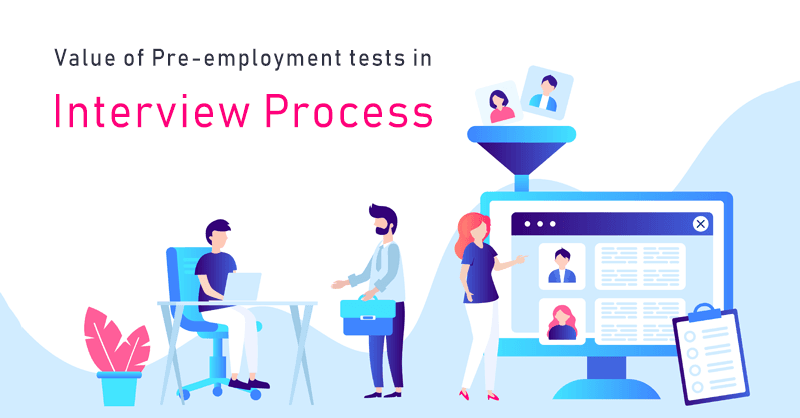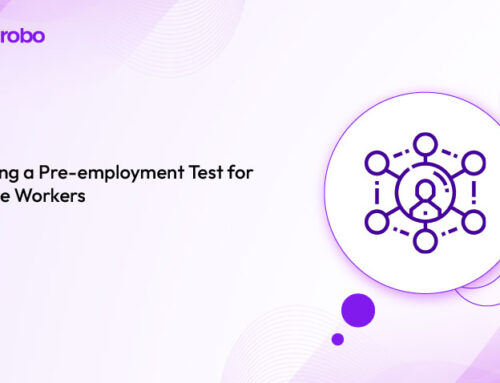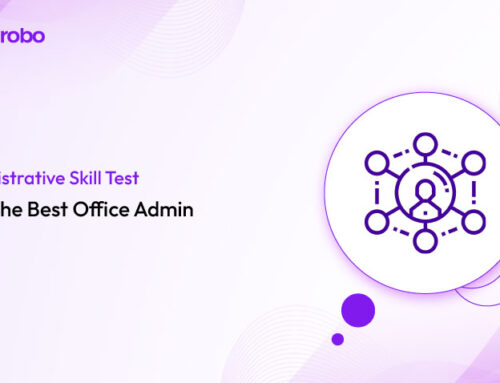
Key Takeaways
-
Pre-employment assessments provide objective data to enhance the hiring decision-making process.
-
They help reduce unconscious bias, improving the quality of hires and promoting workplace diversity.
-
Various types of assessments, including cognitive, personality, and skills tests, measure candidate suitability accurately.
-
Using pre-employment assessments saves time and costs by shortlisting candidates more effectively.
-
Integrating assessments with interviews creates a comprehensive evaluation framework, improving overall recruitment outcomes.
Pre-Employment Assessments: A Key to Better Hiring
Recruiting the right candidates is one of the most critical challenges organizations face today. Traditional hiring methods, which often rely heavily on resumes and interviews, can fall short in accurately predicting job performance.In a competitive global market where top talent is in high demand, organizations cannot afford hiring mistakes. Misjudging a candidate’s suitability leads to higher turnover, lower productivity, and lost time and resources.
This is where understanding the value of pre-employment assessments becomes essential. Pre-employment assessments provide a structured and objective approach to evaluating candidates’ skills, cognitive abilities, personality traits, and job readiness.
They enable organizations to make data-driven hiring decisions, resulting in better-fit employees, improved retention, and a stronger organizational culture. In this blog, we explore why pre-employment assessments are indispensable for modern recruitment strategies and how organizations can leverage them for better hiring outcomes.
What Are Pre-Employment Assessments?
Pre-employment assessments are standardized tests or evaluation tools used during the hiring process to objectively measure candidates’ abilities, traits, and potential fit for a role.
These assessments can evaluate a wide range of factors, including:
-
Cognitive abilities (reasoning, problem-solving)
-
Job-specific skills (technical knowledge, language proficiency)
-
Personality traits (teamwork, leadership, adaptability)
-
Emotional intelligence
-
Situational judgment and decision-making capabilities
The results provide valuable insights that help recruiters and hiring managers make more informed decisions, reducing the reliance on subjective impressions.
Modern assessment platforms like Skillrobo allow companies to customize tests according to job roles, ensuring that only relevant competencies are measured.
Why Are Pre-Employment Assessments Important?
1. Enhancing Objectivity in Hiring
Traditional interviews often rely on gut feelings or subjective judgment, which can introduce bias. Pre-employment assessments provide objective, quantifiable data about a candidate’s skills and traits, making hiring decisions fairer and more reliable.
Example:
A study by Aberdeen Group found that organizations using pre-employment testing reported a 39% lower turnover rate compared to those that did not.
By eliminating guesswork and personal bias, organizations create a more inclusive and equitable hiring process.
2. Improving the Quality of Hires
Assessments ensure that candidates possess the required competencies before they are hired. Organizations can use this data to predict future job performance more accurately.
Impact on Organizations:
-
Higher productivity
-
Better team cohesion
-
Faster time-to-productivity for new hires
Example:
Companies that use structured pre-employment tests report a 24% increase in employee performance ratings, according to SHRM studies.
3. Reducing Time and Cost to Hire
Using assessments early in the hiring process helps recruiters identify high-potential candidates faster, thereby reducing the time spent reviewing unqualified resumes and conducting unproductive interviews.
Statistics:
According to the Talent Board, organizations that use pre-employment assessments experience a 20% faster time-to-hire and reduce cost-per-hire by 15%.
4. Supporting Diversity and Inclusion Goals
Well-designed assessments help eliminate unconscious bias by focusing purely on skills, knowledge, and abilities. This supports diversity initiatives by ensuring a fair and level playing field for all candidates.
Example:
Blind coding tests, widely used in tech hiring, allow candidates to be evaluated purely on their skills without considering their background, gender, or educational history.
Diverse teams bring new perspectives and drive innovation, making fair assessments a key part of modern hiring strategies.
Types of Pre-Employment Assessments
1. Cognitive Ability Tests
Cognitive ability tests measure a candidate’s general intelligence, reasoning abilities, problem-solving skills, and critical thinking capacity. These tests evaluate how well an individual can understand complex ideas, learn quickly, and apply logic to new situations.
Examples:
-
Logical reasoning tests: Assess the ability to recognize patterns and relationships.
-
Numerical reasoning tests: Measure mathematical skills and the ability to interpret data.
-
Verbal reasoning tests: Evaluate comprehension and communication skills through written language.
Why It Matters:
Research consistently shows that cognitive ability is one of the strongest predictors of job performance across a variety of industries and roles. High cognitive ability often correlates with quicker learning curves, better problem-solving, and higher adaptability — all essential traits in today’s fast-paced work environments.
Real-World Application:
Many organizations use cognitive tests during early-stage screening to predict how well a candidate can grasp new technologies or complex tasks required in roles like engineering, finance, and consulting.
2. Personality Tests
Personality assessments help employers understand how a candidate’s behavioral traits align with job roles and organizational culture. These tests focus on attitudes, motivations, interpersonal skills, and adaptability.
Popular Models:
-
Big Five Personality Traits (OCEAN model): Measures openness, conscientiousness, extraversion, agreeableness, and neuroticism.
-
Myers-Briggs Type Indicator (MBTI): Categorizes individuals into 16 personality types based on how they perceive the world and make decisions.
Why It Matters:
Understanding personality traits allows organizations to predict how candidates might interact with teams, handle stress, or adapt to company culture. Hiring for personality fit can improve employee engagement, boost collaboration, and increase retention rates.
Real-World Application:
Sales positions often require extraversion and resilience, while technical or research roles might benefit from individuals who score high in conscientiousness and openness to experience.
3. Skills Tests
Skills assessment tests assess a candidate’s proficiency in specific technical or job-related competencies. These tests evaluate practical abilities that are critical for daily job functions.
Examples:
-
Excel proficiency tests: Assess spreadsheet skills for administrative and financial roles.
-
Coding challenges: Evaluate programming knowledge and logical thinking for software development positions.
-
Typing speed and accuracy tests: Measure essential clerical skills for administrative roles.
Why It Matters:
Skills tests ensure that candidates possess the technical capabilities needed to perform their job functions effectively from day one, reducing training costs and ramp-up time.
Real-World Application:
In tech recruitment, companies like Google and Amazon use coding challenges and live technical assessments to validate a candidate’s problem-solving skills before advancing to final interviews.
4. Situational Judgment Tests (SJTs)
Situational Judgment Tests (SJTs) present candidates with hypothetical, job-related scenarios and multiple possible courses of action. Candidates are evaluated based on the appropriateness of their chosen responses.
Use Cases:
-
Customer service roles: Handling difficult clients or conflict resolution.
-
Management positions: Making leadership decisions under pressure.
-
Conflict resolution scenarios: Managing disputes within teams.
Why It Matters:
SJTs assess soft skills like judgment, problem-solving, interpersonal sensitivity, and professionalism — critical competencies often missed by technical tests.
Real-World Application:
Retail and service-based industries frequently use SJTs to assess how candidates would handle difficult customer interactions, ensuring better service quality and customer satisfaction.
5. Emotional Intelligence (EI) Tests
Emotional Intelligence (EI) tests evaluate a candidate’s ability to recognize, understand, manage, and influence emotions in themselves and others.
Relevance:
-
Leadership roles: Managing teams and motivating others.
-
Sales positions: Building client relationships and handling rejection.
-
High-pressure environments: Maintaining composure and decision-making under stress.
Why It Matters:
High emotional intelligence is linked to better leadership skills, enhanced teamwork, conflict resolution abilities, and greater workplace empathy — all of which contribute to higher organizational performance.
Real-World Application:
Companies in healthcare, hospitality, and leadership-driven industries often prioritize emotional intelligence assessments when hiring for roles that demand high levels of empathy, patience, and resilience.
Benefits of Integrating Pre-Employment Assessments in Hiring
1. Data-Driven Decision Making
Pre-employment assessments provide measurable insights that complement resumes and interviews. This data-driven approach minimizes unconscious bias and helps recruiters make fairer, more accurate hiring decisions.
Why It Matters:
Objective evaluation increases the chances of selecting candidates who are genuinely suited to the role.
2. Increased Predictive Validity
Assessments offer higher predictive validity than interviews alone, meaning they are better at forecasting job performance.
Why It Matters:
When hiring decisions are based on proven predictors like cognitive skills or job-specific competencies, organizations see higher productivity and lower turnover.
3. Better Candidate Experience
Structured assessments create transparency and professionalism, which candidates appreciate. A clear, fair process also reflects well on the company’s brand.
Why It Matters:
A positive assessment experience enhances employer branding and can increase offer acceptance rates.
4. Reduced Employee Turnover
Hiring based on skills and personality fit results in employees who perform better and stay longer with the organization.
Statistic:
According to Talent Board, organizations using pre-employment assessments report a 25% lower first-year turnover rate.
5. Stronger Organizational Performance
Bringing in candidates who match the job requirements leads to better individual and team performance, driving overall business success.
Why It Matters:
Stronger teams mean improved productivity, higher innovation, and a more resilient organization.
Challenges and Best Practices
Potential Challenges
-
Poorly designed assessments may introduce bias or measure irrelevant skills.
-
Lengthy or complex assessments can deter top candidates.
-
Over-reliance on assessment results without considering the broader hiring context.
Best Practices
-
Choose validated and reliable assessment tools that meet legal and psychometric standards.
-
Customize assessments to match specific job roles and skill requirements.
-
Combine assessment results with structured interviews and reference checks for a comprehensive evaluation.
-
Communicate clearly with candidates about the purpose, format, and timeline of assessments.
-
Keep assessments engaging, relevant, and candidate-friendly to maintain candidate interest.
Examples of Pre-Employment Assessment Tools
-
SkillRobo: Offers customizable cognitive, technical, and personality tests with real-time analytics and remote proctoring options.
-
Criteria Corp: Provides aptitude, personality, and skills assessments for multiple industries.
-
Codility: Specializes in coding assessments and technical screening for software development roles.
-
Pymetrics: Uses neuroscience-based games to assess cognitive and emotional traits, improving diversity in hiring.
Choosing the right assessment platform depends on the job role, industry, and specific organizational goals.
How Skillrobo Simplifies Pre-Employment Assessments
Skillrobo simplifies pre-employment assessments through customizable tests, secure remote proctoring, and real-time analytics.
With Skillrobo, organizations can quickly identify top candidates, reduce hiring bias, and make smarter, data-driven hiring decisions.
Conclusion
The value of pre-employment assessments lies in their ability to make hiring decisions more objective, data-driven, and predictive. In an increasingly competitive talent market, organizations that leverage assessments effectively will hire better-fit candidates, reduce turnover, and build stronger, more cohesive teams.
Pre-employment assessments are not meant to replace human judgment but to complement it. When combined with structured interviews, reference checks, and thorough onboarding programs, assessments create a comprehensive evaluation framework that leads to smarter hiring and sustainable organizational growth. As hiring continues to evolve, organizations that invest in robust, science-backed assessment strategies will be better equipped to succeed in a rapidly changing workforce landscape.
FAQs
1. What are pre-employment assessments?
Pre-employment assessments are standardized tests used to evaluate candidates’ skills, cognitive abilities, personality traits, and job readiness. They help organizations make objective and data-driven hiring decisions.
2. Why are pre-employment assessments important in hiring?
Assessments improve the quality of hires by providing measurable insights into a candidate’s abilities and potential fit. They reduce unconscious bias, enhance predictive accuracy, and support better hiring outcomes.
3. What types of pre-employment assessments are commonly used?
Common types include cognitive ability tests, personality assessments, skills tests, situational judgment tests, and emotional intelligence evaluations. Each type measures different attributes critical to job performance.
4. How do pre-employment assessments improve diversity and inclusion?
By focusing on skills and competencies rather than subjective factors, assessments help minimize bias and create a fairer hiring process, supporting diversity, equity, and inclusion (DEI) goals.
5. How can Skillrobo support pre-employment assessments?
Skillrobo offers customizable assessments, secure remote testing, and real-time analytics. It helps organizations quickly identify the best candidates, reduce hiring bias, and streamline their recruitment process.
Table of content
- Key Takeaways
- Pre-Employment Assessments: A Key to Better Hiring
- What Are Pre-Employment Assessments?
- Why Are Pre-Employment Assessments Important?
- Types of Pre-Employment Assessments
- Benefits of Integrating Pre-Employment Assessments in Hiring
- Challenges and Best Practices
- Examples of Pre-Employment Assessment Tools
- How Skillrobo Simplifies Pre-Employment Assessments
- Conclusion
- FAQs









